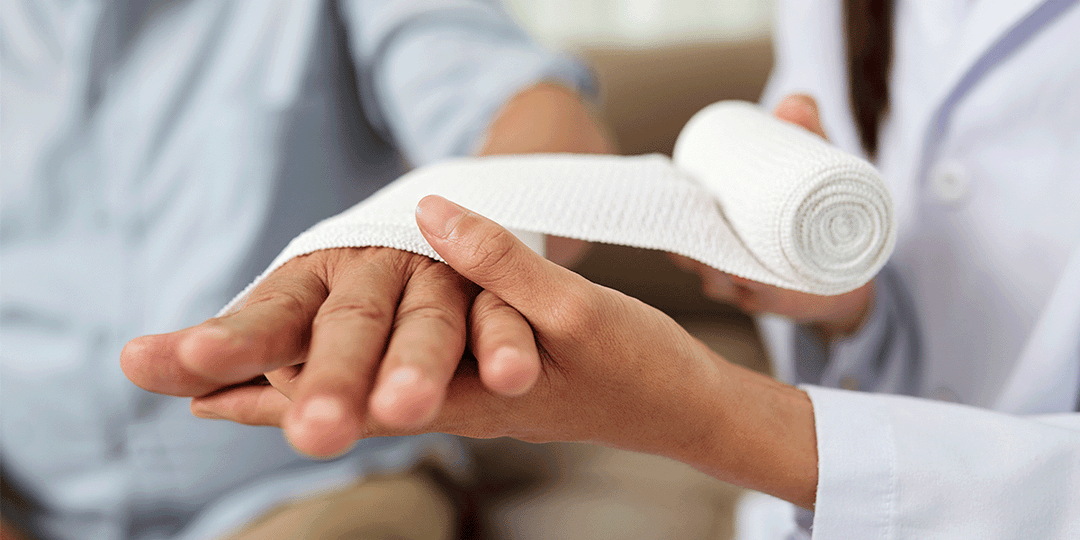Slow-Healing Wound? This Can Help!
Did you know that focusing on better nutrition can promote wound healing?
It’s a fact! Improving your daily nutrition plays an important role in the effectiveness of your healing process, especially after surgery, injury, or pressure ulcers.1
While overall nutrition is vital, specific nutrients stand out for their importance in healing. Prioritizing protein, iron, zinc, vitamin A, and vitamin C plays a significant role in wound care, contributing to the healing of your wounds.2
What Type of Protein Do I Need for Healing?
Your body needs high-quality protein for healing processes. The protein quality is measured using the protein digestibility corrected amino acid score (PDCAAS), which considers essential amino acids and how well the body digests them to achieve a perfect score of 100%.
While milk, eggs, fish, poultry, beef, and pork are all good sources of protein, their PDCAAS scores vary. Unjury® whey protein isolate stands out with a perfect amino acid score–100% PDCAAS.
For those who prefer plant-based protein, soy, peas, quinoa, lentils, and chickpeas are excellent options. However, it’s important to note that not all protein sources are created equal.
Animal-based proteins contain higher levels of essential amino acids, which provide the building blocks to support healing and decrease the time needed to heal.3 Plant-based proteins may require combining various sources to ensure the perfect balance of essential amino acids for healing. If animal protein is not an option in your diet, work with your registered dietitian to incorporate high-protein foods.
Can I Use Nutritional Supplements to Support the Wound-Healing Process?*
Yes, consuming enough protein is essential for simple body functions, and nutritional supplements may be recommended to meet daily protein intake.
If you need to increase the amount of protein in your diet and improve your overall daily nutrition for wound healing, your doctor or registered dietitian might recommend a nutritional supplement like Unjury’s Protein-Centric Meal Replacement, which contains 25-28 grams of protein and a third of your daily micronutrients in each serving.*
Whey protein is recognized as the “gold standard” for protein powder, supporting muscle growth and tissue repair.4 Unjury provides the highest quality whey protein available, and the best part is, it tastes great, making it easier to meet your daily nutrition goals for healing.*
Why Is Whey Protein Recommended for Recovery and Healing Wounds?*
Whey protein is a complete protein, meaning that it contains all nine essential amino acids required for building and repairing body tissues.3 It’s also rich in leucine, which helps stimulate muscle protein synthesis, and glutamine, which supports the immune system.5*
Alternative Protein Sources: Plant-Based Protein
If you are still looking for an option to get high protein in your diet, Unjury offers Planted, a vegan pea protein for those who can’t or prefer not to consume animal-based food sources in their diet.
Pea protein is high in arginine, an important amino acid that has been shown to promote wound healing.6*
“Arginine is a donor to nitric oxide, which increases blood flow and oxygen to the wound, thus increasing collagen formation and reducing inflammation,” according to Mary Ellen Posthauer, RDN, CD, LD, FAND.7
Shop Now
References
1. Saghaleini SH et al. Indian J Crit Care Med. 2018;22(4):283–289.
2. Cleveland Clinic. 2023. https://health.clevelandclinic.org/foods-to-help-healing/.
3. Manouchehr S. US Pharm. 2009;34(9):HS-14-HS-18.
4. West DWD et al. Nutrients. 2017;9(7):735.
5. Cruzat VF et al. J Int Soc Sports Nutr. 2014;11:61.
6. Arribas-López E et al. Nutrients. 2021;13(8):2498.
7. Posthauer ME. 2016. https://www.woundsource.com/blog/what-evidence-there-
Support-arginine-wound-healing.
*These statements have not been evaluated by the Food and Drug Administration (FDA). These products are not intended to diagnose, treat, cure, or prevent any disease.
This blog is for information and education purposes only. This information is not intended to substitute professional medical advice, diagnosis, or treatment. Please consult with your bariatric surgeon or another qualified healthcare provider with any questions in regard to a medical condition. A qualified healthcare professional can best assist you in deciding whether a dietary supplement is suitable based on your individual needs.










